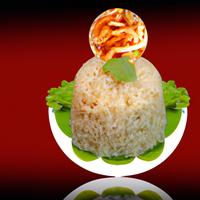
1 serving (30 grams) contains 113 calories, 2.0 grams of protein, 0.2 grams of fat, and 25.0 grams of carbohydrates.

Log this food in SnapCalorie

Nutrition Information
Calories |
301.3 | ||
|---|---|---|---|
% Daily Value* |
|||
| Total Fat | 0.5 g | 0% | |
| Saturated Fat | 0 g | 0% | |
| Polyunsaturated Fat | 0 g | ||
| Cholesterol | 0 mg | 0% | |
| Sodium | 400 mg | 17% | |
| Total Carbohydrates | 66.7 g | 24% | |
| Dietary Fiber | 1.3 g | 4% | |
| Sugars | 6.7 g | ||
| protein | 5.3 g | 10% | |
| Vitamin D | 0 mcg | 0% | |
| Calcium | 2.7 mg | 0% | |
| Iron | 21.6 mg | 120% | |
| Potassium | 93.3 mg | 1% | |
* Percent Daily Values are based on a 2,000 calorie diet. Your daily values may be higher or lower depending on your calorie needs.
Food Attributes
Source of Calories
About Crisp rice
Crisp rice is a lightweight, puffed grain made from rice kernels, often toasted or baked to achieve a crunchy texture. It originates from processing methods used in various global cuisines, with notable popularity in Western snacks and breakfast cereals. Crisp rice is primarily composed of rice, offering carbohydrates as the main source of energy. Some versions may include added sugars, salt, or oils to enhance flavor, making them less nutritious. On the healthier side, plain varieties can be low in fat and provide simple ingredients for energy. Crisp rice is gluten-free, making it suitable for those with gluten sensitivities. However, processed versions might lack fiber and essential nutrients, so nutrition varies by preparation and added ingredients. It’s commonly found in snack bars, cereals, and desserts, such as crispy rice treats. For wholesome choices, select minimally processed options or pair it with nutrient-rich foods.



